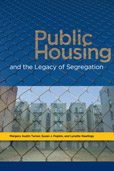|
|
Public Housing and the Legacy of Segregation

|
|
>
|
Document date: November 04, 2008
Released online: November 04, 2008 For the past two decades the United States has been transforming distressed public housing communities, with three ambitious goals: replace distressed developments with healthy mixed-income communities; help residents relocate to affordable housing, often in the private market; and empower former public housing families toward economic self-sufficiency. The transformation has focused on deconcentrating poverty, but not on the underlying role of racial segregation in creating these distressed communities. In Public Housing and the Legacy of Segregation, scholars and public housing officials assess whether—and how—public housing policies can simultaneously address the problems of poverty and race.  Continue reading Continue reading
Topics/Tags: | Race/Ethnicity/Gender Related PublicationsOther Publications by the Authors
Usage and reprints: Most publications may be downloaded free of charge from the web site and may be used and copies made for research, academic, policy or other non-commercial purposes. Proper attribution is required. Posting UI research papers on other websites is permitted subject to prior approval from the Urban Institute—contact [email protected].
If you are unable to access or print the PDF document please contact us or call the Publications Office at (202) 261-5687.
Disclaimer: The nonpartisan Urban Institute publishes studies, reports, and books on timely topics worthy of public consideration. The views expressed are those of the authors and should not be attributed to the Urban Institute, its trustees, or its funders. Copyright of the written materials contained within the Urban Institute website is owned or controlled by the Urban Institute. |
|
|

